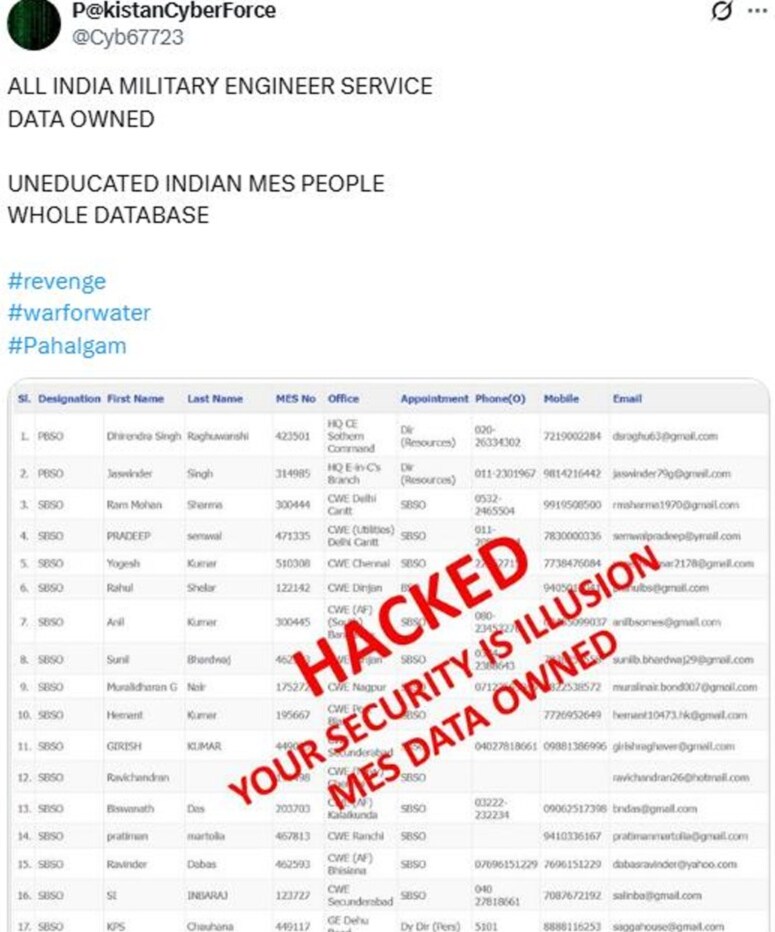Amid tensions after the Pahalgam terror attack, Pakistani hackers have targeted Indian defence websites, allegedly stolen sensitive data, and defaced a PSU website. India has launched emergency audits and stepped up cyber surveillance.
In a serious cyberattack, hackers based in Pakistan have allegedly targeted several Indian defence websites, stealing sensitive data and login credentials of defence personnel. They claimed that the breach affected systems used by armed forces and key defence institutions.

According to early intelligence findings, the attackers gained access to backend systems of official defence portals. Cybersecurity teams are currently assessing the full extent of the damage and working to prevent further data leaks. Emergency audits have been launched across defence networks.
A group calling itself the "Pakistan Cyber Force" claimed responsibility for the attack via its account on social media platform X (formerly Twitter). The group said it had accessed confidential data from the Indian Military Engineering Service (MES) and the Manohar Parrikar Institute for Defence Studies and Analyses (MP-IDSA).

A group calling itself the "Pakistan Cyber Force" has claimed responsibility for the cyber offensive. The group made the announcement on its handle on social media platform X (formerly Twitter), which has since been withheld in India.
In their posts, the group shared images showing defaced web pages from the Armoured Vehicle Nigam Limited (AVNL) website, a Public Sector Undertaking (PSU) under India’s Ministry of Defence. The image showed an Indian tank replaced by the Al Khalid tank, a Pakistani battle tank, along with a Pakistan flag. Another post allegedly contained a list of Indian defence personnel and carried the message: “Hacked. Your security is illusion. MES data owned.”

The group further claimed to have stolen over 10 GB of data, including records of 1,600 users from the Manohar Parrikar Institute for Defence Studies and Analyses (MP-IDSA) and the Military Engineer Services (MES) — both critical defence-related institutions.
As a safety measure, the official AVNL website was immediately taken offline. Officials said that the site is undergoing a full security audit to assess any possible damage caused by the attempted defacement and to restore its integrity.
Indian cybersecurity agencies are now on high alert. Experts are closely watching cyberspace for any further intrusions, especially from groups believed to be supported or coordinated by Pakistan’s intelligence services. Emergency audits are being carried out on defence networks, and fresh digital safeguards are being introduced to block future attacks.

This wave of cyber aggression comes at a time when India and Pakistan are facing one of their worst diplomatic crises in years. Relations have worsened significantly since the terror attack in Jammu and Kashmir’s Pahalgam, where 25 tourists and a local Kashmiri were brutally killed. The Resistance Front, widely seen as a front for Pakistan-based Lashkar-e-Taiba, claimed responsibility.
India has promised a strong and fitting response. High-level meetings have taken place between Prime Minister Narendra Modi, Home Minister Amit Shah, and top defence and security officials. As part of its diplomatic retaliation, India has suspended the Indus Waters Treaty, halted visa services for Pakistani citizens, and is exploring more measures to isolate Pakistan globally.
On its part, Pakistan has denied involvement in the Pahalgam attack and demanded evidence — a familiar response pattern observed after previous attacks like 26/11 in Mumbai. Despite receiving dossiers and proof in the past, Pakistan has rarely taken meaningful steps to punish the attackers.
Cybersecurity experts warn that the ongoing cyberattacks are likely to continue, especially as tensions remain high. Previous incidents have shown a similar pattern, with websites linked to the Army Public School in Srinagar and Ranikhet, the Army Welfare Housing Organisation (AWHO), and the Indian Air Force Placement Organisation being targeted.
Authorities say efforts are now underway to build stronger firewalls, improve cybersecurity awareness within defence departments, and reduce vulnerabilities in digital platforms.
As India deals with the aftermath of a brutal terror strike, this cyber offensive by Pakistani hackers has opened up yet another front of hostility — this time in the digital domain.


